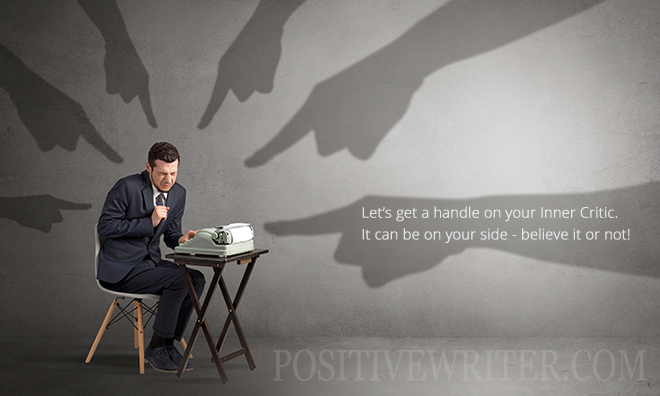You know your Inner Critic.
It’s the voice inside that tells you you aren’t good enough, your writing sucks lemons, and that you’re crazy for even thinking anyone wants to read a word of anything you have to say.

It’s the voice that trips you up when you’re so close to victory you can taste it.
It’s the nagging feeling that your dream is stupid, but you really want to go after it anyway.
I know this voice, because it tormented me for most of my childhood.
Fortunately, as a young adult, I learned that it doesn’t have to be that way.
Every Coin Has Two Sides
When you’re wavering between two equally good decisions, how do you decide what to do?
You flip a coin.
If it’s heads, you grill steak.
If it’s tails, you bake a casserole.
It’s not just about food. It’s about making a choice. When they’re both good, you can stand there forever wavering. Then you’re no better off than a leaf tossed about by the wind.
You’re not helpless. You can decide. Even if you just flip a coin.
Your voice is yours. It’s inside you. Like it or not, it’s there to stay. You can’t make it go away.
But you can teach it how to behave.
I got control over my negative voice when I traded my old assumptions for better ones.
My old assumptions were a lot like anyone who struggles with self-doubt, fear, and insecurity.
● You’re not good enough.
● You don’t matter.
● Nobody cares about you, and they never will.
Did you notice something about those statements?
They’re framed as absolutes.
Here’s what I mean. I didn’t give conditions to those statements. I didn’t say, “If you’re an artist, you probably won’t fit in at an accounting convention.” That’s specific and pretty obvious. And it’s only absolute in that circumstance. When you say, “I’m not good enough” you imply that this is true everywhere, all the time.
It’s not.
Find a better frame. See the world in terms of case by case situations. You don’t have to fit in everywhere. You do fit well in some places. You’re more like a puzzle piece than a square trying to fit in a world of round holes.
Celebrate that.
Now let’s get a handle on your Inner Critic. It really can be on your side – believe it or not!
In this post, we’ll look at three ways it can be your best friend instead of your worst enemy.
Your Critic is a Refiner, Not a Destroyer
Ovens heat things. It’s what they do.
All ovens aren’t alike.
Some ovens are for pottery. You put your art in and in time you bring out a masterpiece. That’s a refining oven better known as a kiln.
Funeral homes have ovens, too. They’re used to turn your loved ones into ashes.
Which kind of fire is your Inner Critic?
It depends on what you use it for.
You can use it to make you better or bitter.
You use it to make you better with a few simple steps.
First, write your draft fast. Give yourself a prompt and don’t stop to think. Don’t check for typos on the way. That’s like getting distracted by a squirrel when your daughter is talking to you. Push on. This is a racetrack, not a scenic highway. Get those words down and don’t worry about speeding tickets. There aren’t any on the freewriting highway.
Your critic can take a nap while you vomit out your draft.
This is fun. It’s like jumping into a pool. You get refreshed by getting in the water. If you stop to worry about how cold the water might be, you’ll stay on the deck forever.
Once all your words are on paper, take a break. Eat lunch. Take a nap if you’re into that. You might be tired after all that effort anyway. Give your brain time to reset.
Then come back and edit.
Jody Picault famously said you can’t edit a blank page. No worries! You’ve got a page that if filled to the borders.
Now let’s consider the point of editing, shall we?
You aren’t here to tear yourself apart. You’re editing your words. You’re looking for impact – specifically, the one you intended when you sat down to write. Did you trigger the reader’s emotions? Pretend like this is someone else’s work. It will seem more like it if your break is long enough. Ask yourself, how can I maximize my impact? How can I use these words to fulfill my purpose.
Then give it all you’ve got.
And please, don’t forget to get excited. Your refining here, not destroying.
There’s a world of difference.
Your Inner Bodyguard
When you’re carefree, pouring out your soul with no inhibitions, you might say something offensive.
Since you’re blazing through your draft, you might miss it. That’s okay. You’re not worrying about it then.
Your Inner Critic can sort it all out.
When you run into something you wrote that gives you pause, ask yourself one question.
Should I say this?
If you’d say it in public where someone could punch you, then go for it.
If you have no doubt you shouldn’t say it, don’t.
If you’re not sure, then you can probably leave it in.
I can’t guarantee no one will be offended. And who knows? Your edginess can give your message the punch it needs to reach your reader when she needs it most.
It’s also a good way to stand out.
Let your Inner Critic keep you from getting a bloody nose. Don’t let it keep you from speaking the truth or making an impact.
Your Critic Has Your Best Interests at Heart
Your Critic is part of you. It’s always going to be there. It’s not trying to sabotage you. It really wants the best for you.
It might not always know what to do, but let’s be honest – do you?
We’re all just doing the best we can.
Sometimes your Critic is worth listening to. Here’s how to tell.
● Will believing this make me better?
● Will this idea really ruin everything?
● How is this in my best interest?
When you answer these questions, you’re using your head instead of your feelings. You’re responding instead of reacting. And more often than not, you’ll find yourself daring greatly and shrinking less.
We’re all wired for survival. Our intentions are usually good (at least as we define them). So when your Critic starts ranting and raving, pause. Understand. Listen to hear what it’s really saying. Are you hurting? Is something wrong? What can we do to make this wrong thing right?
You’ll do this again and again for as long as you live.
The more you do, the less you’ll have to over time.
What you’re doing when you talk back to your critic and question its assumptions is paving new mental pathways. If you’re going to be in a rut, why not be in one that serves instead of harms you?
Guide your own heart. It’s got your best interests in focus.
When you do, the best of you will come out in every word.

